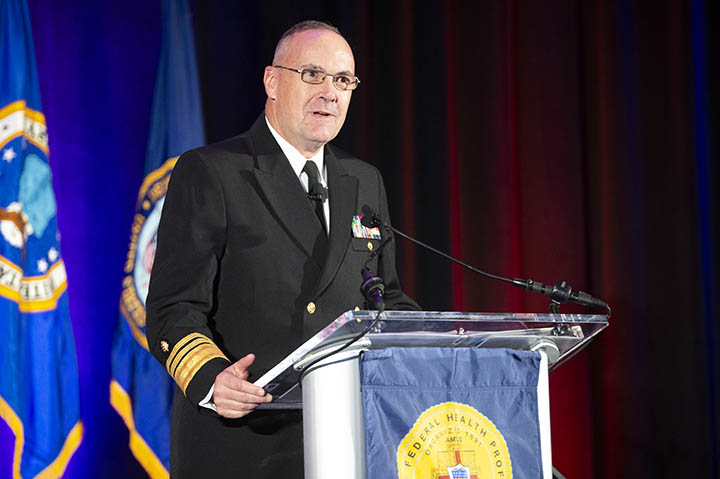
Looking to the future: Leaders come together at AMSUS

Vice Adm. C. Forrest Faison III, U.S. Navy surgeon general, delivers remarks at the opening of the AMSUS 2018 annual meeting. (MHS photo)
NATIONAL HARBOR, Md. – Military leaders are looking to the future of medicine, as well as the military’s role in finding solutions to emerging global health issues and the delivery of health care, as they come together through AMSUS (The Society for Federal Health Professionals), an annual meeting for health professionals.
“It’s perhaps now more than ever important to talk, share thoughts, and look to the future,” said Vice Adm. C. Forrest Faison III, U.S. Navy surgeon general and 2018 AMSUS Annual Meeting honorary host, while speaking at the 2018 AMSUS Annual Meeting in National Harbor, Maryland, on Nov. 27. “In my 38 years of active service, I’ve never seen such transformational change [as we are seeing] right now in health care.”
Reflecting this year’s conference theme, “The Future of Healthcare is Now,” Faison said that while advancements in medicine contributed to the highest combat survivability rate among U.S. service members in Iraq and Afghanistan, identifying challenges as well as the opportunities is essential to military medicine as it moves forward. And at a time when global health threats remain, ranging from Ebola to the influenza, it’s an important for leaders to come together to solve these issues, he said.
“We have much to be grateful for and we have much to celebrate in our past, but we have many things we have to continue to work on,” said keynote speaker U.S Public Health Service Adm. Brett Giroir, assistant secretary for health for the Department of Health and Human Services and senior advisor for opioid policy.
Giroir touched on several challenges currently facing the health care community, including substance abuse disorder and risk of influenza, which killed roughly 80,000 Americans last year despite being preventable. He also discussed concerns surrounding risks of infectious disease, rogue states and organizations, life expectancy rates, and the health state of the nation’s youth. More than 70 percent of people ages 18-24 in the United States would fail to qualify for enlistment in the U.S. military, due primarily to obesity, drugs, and other reasons, he said.
“If we’re going to get ahead of the health care crisis, ahead of cost, ahead of health in the U.S., we have to start dealing with some of these issues,” said Giroir.
The AMSUS Annual Meeting, which runs from Nov. 27 through Nov. 30, brings together top military and federal health leaders, industry experts, and medical professionals. The conference will feature leadership from Defense Health Agency and the office of the Assistant Secretary of Defense for Health Affairs, including DHA Director Vice Adm. Raquel Bono and the service surgeon generals. Sessions take place throughout the week on topics such as global health, Military Health System transformation, DoD’s new electronic health record MHS GENESIS, virtual health, and pain management. Speakers will also share knowledge of the latest advances in military and federal health care, including innovative research and patient care.
“Despite the advances of modern medicine and in public health, we have what I believe are unprecedented challenges within the United States and the world that we’re going to have to solve,” said Giroir. “It’s our commitment to provide leadership to our nation and the world to get ourselves out of these problems.”





















.png)









No hay comentarios:
Publicar un comentario